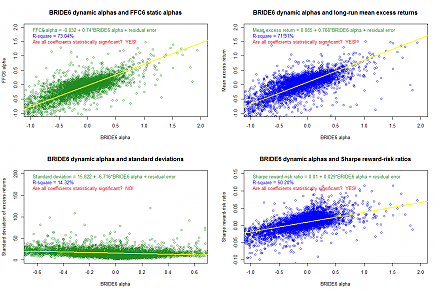

2019-08-24 14:38:00 Sat ET
stock market gold oil stock return s&p 500 asset market stabilization asset price fluctuations stocks bonds currencies commodities funds term spreads credit spreads fair value spreads asset investments
Warren Buffett warns that the current cap ratio of U.S. stock market capitalization to real GDP seems to be much higher than the long-run average benchmark. With the current cap ratio of 146.4x, U.S. stock market capitalization represents at least 146 times American national income per year. This current cap ratio exceeds the long-run average benchmark of 80x by more than 80%, and is historically second to the peak of irrational exuberance near 148.5x during the dotcom bubble back in March 2000. From 2018Q3 to 2019Q2, the S&P 500 delivers a 12-month net profit of about $135 per share, and the S&P 500 aggregate share price rises to $3000+ per share. The equivalent S&P 500 P/E ratio thus hovers in the broad range of 22x to 24x. This narrow range well exceeds the long-run average benchmark of 15x to 16x. Long-term stock market capitalization and corporate profitability should move in tandem. If these key metrics stray too far apart, it can be prohibitively expensive for U.S. public corporations to get back to balance.
From this fundamental perspective, the normal stock market forces may pull equity valuation back to the long-run average yardsticks relative to U.S. national income and corporate profitability.
If any of our AYA Analytica financial health memos (FHM), blog posts, ebooks, newsletters, and notifications etc, or any other form of online content curation, involves potential copyright concerns, please feel free to contact us at service@ayafintech.network so that we can remove relevant content in response to any such request within a reasonable time frame.
2019-04-01 08:28:00 Monday ET

OraSure and its subsidiary DNA Genotek specialize in the lean production of home DNA spit tubes. OraSure extracts core genetic information from microbiome s
2024-10-31 09:26:00 Thursday ET

Generative artificial intelligence (Gen AI) uses large language models (LLM) and content generation tools to enhance human lives with better productivity.
2020-04-24 11:33:00 Friday ET

Disruptive innovations tend to contribute to business success in new blue-ocean markets after iterative continuous improvements. Clayton Christensen and
2022-02-02 10:33:00 Wednesday ET

Our proprietary alpha investment model outperforms most stock market indices from 2017 to 2022. As of early-January 2023, the U.S. Patent and Trademark O
2023-01-03 09:34:00 Tuesday ET

USPTO fintech patent protection and accreditation As of early-January 2023, the U.S. Patent and Trademark Office (USPTO) has approved
2020-08-01 07:28:00 Saturday ET

Technological advances, geopolitical risks, and pandemic outbreaks cannot shake investor confidence in the American dollar as the global reserve currency.